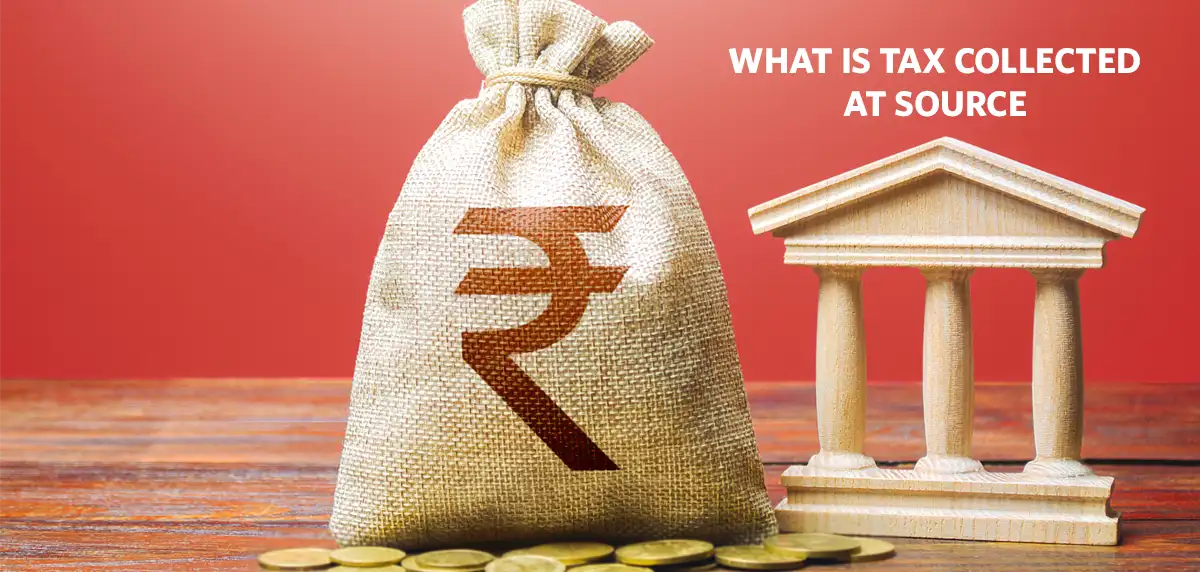The taxation system in India is fairly straightforward. From categorisation to filing, most of the information and processes are available online. However, if you want hassle-free experiences with taxation, knowing the basics becomes crucial. Tax Collected at Source, or TCS, is one of the tax types that all consumers and sellers need to be well-versed in.
What is Tax Collected at Source?
Tax Collected at Source (TCS) is a mechanism where specific sellers collect taxes directly from buyers for certain goods and transactions, as per Section 206C of the Income Tax Act. But what is TCS? And why does it matter? Tax Collected at Source refers to the tax that is charged upfront at the point of purchase. Unlike TDS, where tax is deducted from income, TCS is collected from the buyer at sale. Sellers include companies, co-operative societies, and others. Buyers included in the category of those eligible to be charged TCS can be a wide range. However, some buyer may be exempt based on prevalent regulations. TCS ensures immediate revenue for the government and simpler compliance, thus ensuring better compliance.
What Goods and Transactions are Covered Under TCS Provisions?
The Income Tax Act specifies that TCS applies to certain goods and transactions, helping the government collect taxes directly at the time of sale. These include:
- Alcoholic liquors (like IMFL)
- Timber
- Tendu leaves
- Scrap
- Minerals
- Bullion
Higher-value purchases such as specific types of jewellery and motor vehicles costing above ₹10 lakhs may also attract TCS.
Numerous sellers, ranging from the Central Government to local authorities, and even co-operative societies, can collect TCS at source. Buyers, on the other hand, are typically all those who procure these goods, except for specific entities such as public sector companies, consulates, and clubs. TCS become a consideration where the goods are bought purely for trading. However, if these items serve as inputs for manufacturing or processing, no TCS is required.
What are the TCS Rates in India?
Below is a concise overview of the current Tax Collected at Source (TCS) rates in India, as per the Income Tax Department. The following table lists standard rates along with reduced rates that were applicable from May 14th, 2020, to March 31st, 2021, for selected goods. Note that an interest charge of 1% per month applies for late payment of TCS.
Type of Goods
| Existing TCS Rate
| Reduced TCS Rate
|
Alcoholic liquor for human consumption
| 1.00%
| NA
|
Timber (forest lease)
| 2.50%
| 1.875%
|
Tendu Leaves
| 5.00%
| 3.75%
|
Timber (other than leased)
| 2.50%
| 1.875%
|
Other Forest Produces (excl. timber, tendu leaves)
| 2.50%
| 1.875%
|
Scrap
| 1.00%
| 0.75%
|
Parking, Toll, Mining, Quarrying
| 2.00%
| 1.50%
|
Minerals (iron ore, lignite, coal)
| 1.00%
| 0.75%
|
Bullion valued over ₹2 lakhs or Jewellery over ₹5 lakhs
| 1.00%
| NA
|
Motor vehicle purchase exceeding ₹10 lakhs
| 1.00%
| 0.75%
|
To better calculate the TCS applicable on your transactions, you may use a relevant online calculator. These may work same as income tax calculators, giving you a better understanding of the estimates that may be a hassle to calculate manually.
Form 27D (TCS Certificate)
Form 27D is an official proof issued by the seller to the buyer, confirming the TCS collected at the time of sale. It specifies critical details such as the seller’s Tax Deduction and Collection Account Number (TAN), the buyer’s Permanent Account Number (PAN), and the total TCS amount. This document is meant to help buyers claim credit for the TCS, thereby simplifying their tax filing process. Properly maintaining Form 27D ensures smoother compliance and prevents potential discrepancies.
Interest and Penalties Levied on Late Payment of TCS
Prompt deposit of TCS is crucial to avoid unnecessary financial or legal hurdles. If the TCS amount is not paid on time, the government levies interest at 1% per month (or part of a month) until the dues are cleared. Failing to file TCS returns by the due date can also invite penalties under Section 271H, ranging from ₹10,000 to ₹1,00,000. Such non-compliance risks additional scrutiny from tax authorities, emphasising the need for timely submission.
Exclusions and Exemptions from TCS
In certain cases, TCS does not apply or is exempt. Exclusions typically include dealings with government agencies, exports, and transactions carried out for purely personal use. Moreover, if a buyer secures a lower or zero deduction certificate under Section 206C, TCS obligations may not arise for that particular transaction. Understanding such exclusions can prevent unnecessary tax deductions and simplify financial planning. It also ensures that TCS is correctly levied only on transactions designated by law, helping both buyers and sellers maintain compliance without overburdening their cash flow.
TDS vs. TCS – Key Differences
Both TDS (Tax Deducted at Source) and TCS (Tax Collected at Source) are mechanisms designed to streamline tax collection, but they function differently. TDS is subtracted by the payer, such as an employer or a company, when making payments like salaries or professional fees. Meanwhile, TCS is collected by the seller from the buyer for certain goods, like scrap or minerals, and over specific transactions. Thus, TDS revolves around deducting taxes at the point of income, while TCS tackles tax obligations at the point of sale. Together, they help minimise tax evasion and ensure smoother compliance.
Tax Collected at Source (TCS) plays a pivotal role in promoting transparency and compliance within India’s tax framework. It is meant to enhance revenue flow to the government while simplifying tax management for everyone involved. By understanding what TCS tax is, both buyers and sellers can streamline payment processes and avoid penalties. Whether you’re purchasing goods like timber, jewellery, or vehicles, knowing the relevant rates and obligations prevents unnecessary surprises. You can also leverage tools like online investment calculators to ensure accurate budget planning and long-term financial security.
























